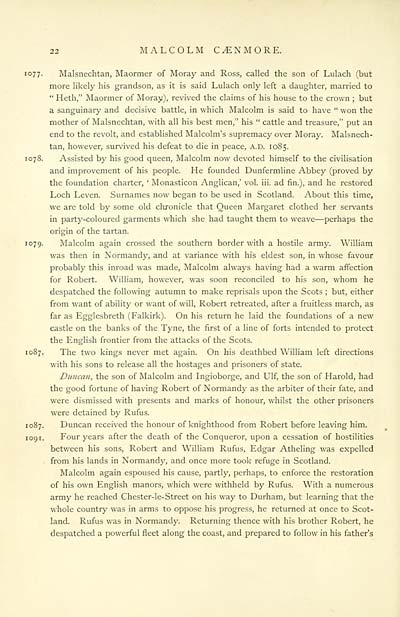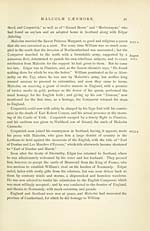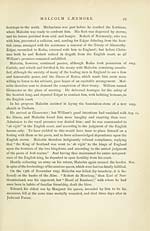Family records of the Bruces and the Cumyns
(34) Page 22
Download files
Complete book:
Individual page:
Thumbnail gallery: Grid view | List view

22 MALCOLM C^ENMORE.
1077. Malsnechtan, Maormer of Moray and Ross, called the son of Lulach (but
more likely his grandson, as it is said Lulach only left a daughter, married to
" Heth," Maormer of Moray), revived the claims of his house to the crown ; but
a sanguinary and decisive battle, in which Malcolm is said to have " won the
mother of Malsnechtan, with all his best men," his " cattle and treasure," put an
end to the revolt, and established Malcolm's supremacy over Moray. Malsnech-
tan, however, survived his defeat to die in peace, A.D. 1085.
1078. Assisted by his good queen, Malcolm now devoted himself to the civilisation
and improvement of his people. He founded Dunfermline Abbey (proved by
the foundation charter, ' Monasticon Anglican,' vol. iii. ad fin.), and he restored
Loch Leven. Surnames now began to be used in Scotland. About this time,
we are told by some old chronicle that Queen Margaret clothed her servants
in party-coloured garments which she had taught them to weave — perhaps the
origin of the tartan.
1079. Malcolm again crossed the southern border with a hostile army. William
was then in Normandy, and at variance with his eldest son, in whose favour
probably this inroad was made, Malcolm always having had a warm affection
for Robert. William, however, was soon reconciled to his son, whom he
despatched the following autumn to make reprisals upon the Scots ; but, either
from want of ability or want of will, Robert retreated, after a fruitless march, as
far as Egglesbreth (Falkirk). On his return he laid the foundations of a new
castle on the banks of the Tyne, the first of a line of forts intended to protect
the English frontier from the attacks of the Scots.
1087. The two kings never met again. On his deathbed William left directions
with his sons to release all the hostages and prisoners of state.
Duncan, the son of Malcolm and Ingioborge, and Ulf, the son of Harold, had
the good fortune of having Robert of Normandy as the arbiter of their fate, and
were dismissed with presents and marks of honour, whilst the other prisoners
were detained by Rufus.
1087. Duncan received the honour of knighthood from Robert before leaving him.
1091. Four years after the death of the Conqueror, upon a cessation of hostilities
between his sons, Robert and William Rufus, Edgar Atheling was expelled
from his lands in Normandy, and once more took refuge in Scotland.
Malcolm again espoused his cause, partly, perhaps, to enforce the restoration
of his own English manors, which were withheld by Rufus. With a numerous
army he reached Chester-le-Street on his way to Durham, but learning that the
whole country was in arms to oppose his progress, he returned at once to Scot-
land. Rufus was in Normandy. Returning thence with his brother Robert, he
despatched a powerful fleet along the coast, and prepared to follow in his father's
1077. Malsnechtan, Maormer of Moray and Ross, called the son of Lulach (but
more likely his grandson, as it is said Lulach only left a daughter, married to
" Heth," Maormer of Moray), revived the claims of his house to the crown ; but
a sanguinary and decisive battle, in which Malcolm is said to have " won the
mother of Malsnechtan, with all his best men," his " cattle and treasure," put an
end to the revolt, and established Malcolm's supremacy over Moray. Malsnech-
tan, however, survived his defeat to die in peace, A.D. 1085.
1078. Assisted by his good queen, Malcolm now devoted himself to the civilisation
and improvement of his people. He founded Dunfermline Abbey (proved by
the foundation charter, ' Monasticon Anglican,' vol. iii. ad fin.), and he restored
Loch Leven. Surnames now began to be used in Scotland. About this time,
we are told by some old chronicle that Queen Margaret clothed her servants
in party-coloured garments which she had taught them to weave — perhaps the
origin of the tartan.
1079. Malcolm again crossed the southern border with a hostile army. William
was then in Normandy, and at variance with his eldest son, in whose favour
probably this inroad was made, Malcolm always having had a warm affection
for Robert. William, however, was soon reconciled to his son, whom he
despatched the following autumn to make reprisals upon the Scots ; but, either
from want of ability or want of will, Robert retreated, after a fruitless march, as
far as Egglesbreth (Falkirk). On his return he laid the foundations of a new
castle on the banks of the Tyne, the first of a line of forts intended to protect
the English frontier from the attacks of the Scots.
1087. The two kings never met again. On his deathbed William left directions
with his sons to release all the hostages and prisoners of state.
Duncan, the son of Malcolm and Ingioborge, and Ulf, the son of Harold, had
the good fortune of having Robert of Normandy as the arbiter of their fate, and
were dismissed with presents and marks of honour, whilst the other prisoners
were detained by Rufus.
1087. Duncan received the honour of knighthood from Robert before leaving him.
1091. Four years after the death of the Conqueror, upon a cessation of hostilities
between his sons, Robert and William Rufus, Edgar Atheling was expelled
from his lands in Normandy, and once more took refuge in Scotland.
Malcolm again espoused his cause, partly, perhaps, to enforce the restoration
of his own English manors, which were withheld by Rufus. With a numerous
army he reached Chester-le-Street on his way to Durham, but learning that the
whole country was in arms to oppose his progress, he returned at once to Scot-
land. Rufus was in Normandy. Returning thence with his brother Robert, he
despatched a powerful fleet along the coast, and prepared to follow in his father's
Set display mode to:
![]() Universal Viewer |
Universal Viewer | ![]() Mirador |
Large image | Transcription
Mirador |
Large image | Transcription
Images and transcriptions on this page, including medium image downloads, may be used under the Creative Commons Attribution 4.0 International Licence unless otherwise stated. ![]()
| Histories of Scottish families > Family records of the Bruces and the Cumyns > (34) Page 22 |
|---|
| Permanent URL | https://digital.nls.uk/95071394 |
|---|
| Description | A selection of almost 400 printed items relating to the history of Scottish families, mostly dating from the 19th and early 20th centuries. Includes memoirs, genealogies and clan histories, with a few produced by emigrant families. The earliest family history goes back to AD 916. |
|---|

